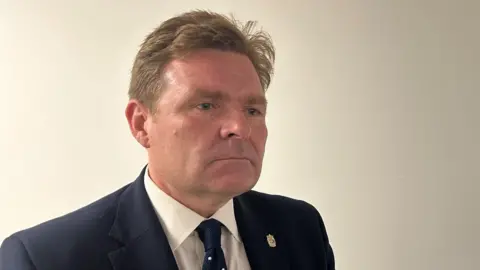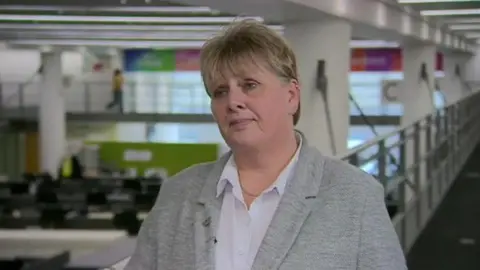Extra £315m for struggling West Midlands councils
 PA Media
PA MediaExtra support worth a total of £315m is available to five West Midlands councils in the form of borrowing and other means to boost budgetary breathing space.
They are among 30 under-pressure councils across the country being helped by the government to protect services during the 2025-26 financial year.
The amounts linked to each authority reflect how much wiggle room they now have to balance budgets, and come in the form of financing rather than simple cash awards. Birmingham City Council's package is the largest nationally at £180m.
Struggling authorities were told on Thursday they could be loaned the money by the Treasury, or sell off some assets to meet day-to-day revenue costs.
But for the first time councils were instructed not to dispose of community and heritage assets to balance their books.
The Ministry of Housing, Communities and Local Government (MHCLG) confirmed more councils had requested exceptional financial support this year than any other year since the process was established in 2020.
In addition to Birmingham, Shropshire Council may take advantage of an extra £26.9m, Solihull Council £32.6m, Stoke-on-Trent City Council £16.8m and Worcestershire County Council £33.6m.

Earlier this month, beleaguered Birmingham City Council was denied permission to increase its council tax by 9.99% to help it with its budget.
The authority declared itself effectively bankrupt in October 2023 as it struggled to deal with equal pay claims originally estimated to total £750m.
Government-appointed commissioners were brought in and since then residents in the city have seen cuts to services as well as a council tax rise of 10% for the 2024-25 financial year.
Bosses at Shropshire Council announced earlier this week they had identified more than £51m in savings, and had managed to balance their books for the coming year.
In Stoke-on-Trent, the council has become no stranger to "exceptional" support – this will be its third successive bailout.
Last year the authority was granted £48m and is now spending £2.8m per year in interest to service its debt.
Analysis
By James Pearson, BBC political reporter, Hereford and Worcester
It's called "exceptional" financial support.
But with 30 local authorities up and down the country set to receive it, can it really be considered exceptional anymore?
With so many struggling local authorities in need of help, attention is shifting from their individual failings to the flaws in the funding system of local government.
Right now, Labour is driving forward its own devolution agenda.
It argues merging councils – especially in two-tier areas like Worcestershire, Warwickshire and Staffordshire – will streamline services and save money.
But even if that becomes reality, many councillors doubt the reforms will do anything to reduce the relentless demand and cost pressures councils face every year in services such as social care and home-to-school transport.
While this financial support will stop council bosses from having to issue section 114 notices - an admission they can no longer balance the books - it is not a long-term fix.

Local government minister Jim McMahon said the government was "under no illusion of the state of council finances" and was committed to getting councils "back on their feet".
He said: "We are working with local leaders, encouraging councils to come in confidence where needed to seek help and be assured we will offer a relationship of partnership - not punishment - in our joint mission to improve public services for communities and create economic stability."
MHCLG said increases in the access to financing were only agreed on "an exceptional basis".
Not all requests for support were granted and no request was agreed to in its entirety, it added.
Follow BBC Birmingham on BBC Sounds, Facebook, X and Instagram.
